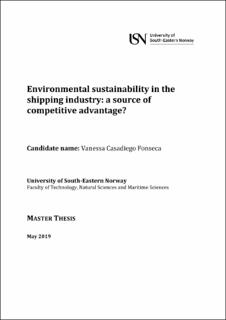Environmental sustainability in the shipping industry: a source of competitive advantage?
Master thesis
Permanent lenke
http://hdl.handle.net/11250/2637868Utgivelsesdato
2019Metadata
Vis full innførselSamlinger
Sammendrag
The purpose of this thesis is to study if implementing green shipping practices (GSPs) and environmental sustainability projects could help ship-owning companies to provide or strengthen competitive advantage, in addition to reducing their negative impact on the environment. With this purpose, a multiple case study methodology was conducted. Semi-structured interviews with informants from ship-owning companies were carried out to collect primary data.
The findings suggest that environmental sustainability can impact positively on competitive advantage by reducing costs, increasing revenues or strengthening the firm’s core competencies, but it is subject to the company’s sustainability approach, actions, sustainability drivers, and challenges. Activities related to green design, green operations and technical adaptations are perceived as sources of competitive advantage. The evidence also shows that some of the factors that influence the ability of a company to gain a competitive advantage from green initiatives are the company’s approach to sustainability, the ability to effectively manage its stakeholders, the implementation of innovative solutions, and the control systems and metrics to evaluate the environmental performance and the effects of GSPs.
This thesis contributes with an overall model for achieving competitive advantage from environmental sustainability, adds to the discussion around environmental sustainability in the shipping industry, and validates the existing theory. It has theoretical and practical implications and suggests areas for further study.
Keywords: Environmental sustainability, Green Shipping Practices (GSPs), competitive advantage
